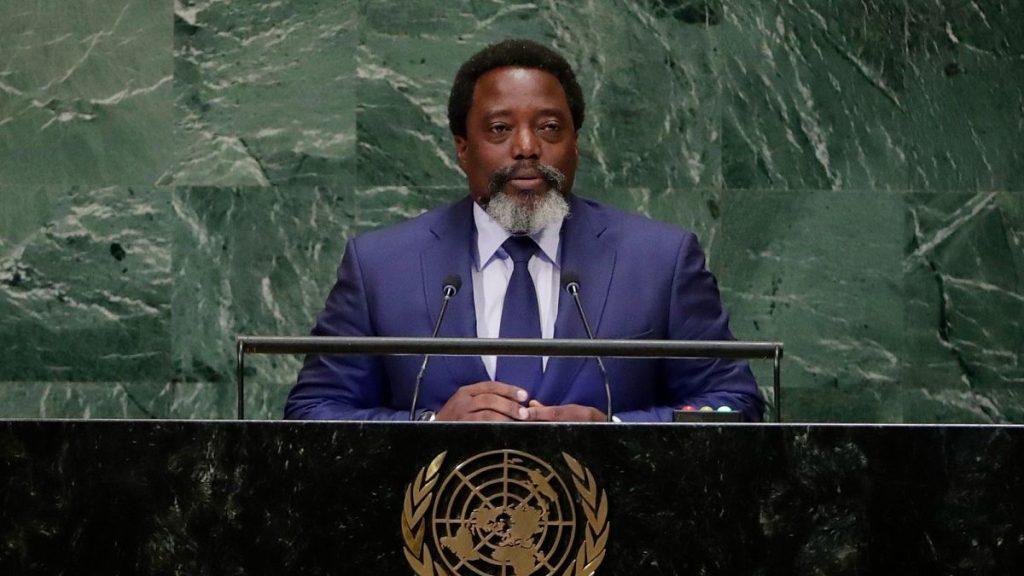In a significant political move, the Democratic Republic of Congo’s (DRC) parliament has voted to lift the immunity of former President Joseph Kabila, allowing for potential prosecution regarding allegations of his support for M23 rebels. Kabila, who ruled the nation from 2001 to 2019, has denied the accusations, which involve serious charges including treason and war crimes. The decision, made during a late-night secret ballot, could have far-reaching implications for the country’s political landscape and its ongoing conflicts in the east.
| Article Subheadings |
|---|
| 1) Lifting of Immunity: Details and Implications |
| 2) The Allegations Against Kabila |
| 3) The Current Political Climate in DRC |
| 4) Impact on Conflict in Eastern DRC |
| 5) Reactions from Kabila and Political Parties |
Lifting of Immunity: Details and Implications
On Thursday, the DRC parliament took a decisive step by voting to rescind the lifetime immunity enjoyed by former President Joseph Kabila, as part of a broader initiative led by the current administration. This decision came as a result of a secret ballot, where 88 lawmakers voted in favor while only five expressed opposition.
Kabila, as an honorary senator, had previously been shielded from legal proceedings, a privilege that has now been revoked. This action opens the door for prosecution concerning allegations tied to his alleged support of insurgent activities in eastern Congo. Following the vote, the DRC’s military attorney general expressed intentions to pursue legal actions against the former leader.
The Allegations Against Kabila
The allegations against Joseph Kabila are grave, with accusations ranging from treason and war crimes to participation in an insurrectional movement. Justice Minister Constant Mutamba outlined that these charges stem from Kabila’s purported involvement in aiding M23 rebels, who have been active in the conflict-ridden eastern region of the country.
Kabila’s alleged support for the rebels has been a matter of public speculation, especially as recent events have unveiled a series of military confrontations in which the M23 has gained substantial territory. This has raised questions not only about Kabila’s previous government but also about the ongoing unrest that affects millions of civilians in DRC.
The Current Political Climate in DRC
The political atmosphere in the DRC is undeniably charged as President Felix Tshisekedi navigates through challenges presented by both the opposition and internal factions within the government. The vote to lift Kabila’s immunity is seen not just as a legal maneuver but also as a strategic political step towards consolidating power and addressing the turmoil rooted in past administrations.
Tshisekedi’s government has taken a more aggressive stance against Kabila’s political party, the People’s Party for Reconstruction and Democracy (PPRD), which has faced scrutiny and repression following last month’s suspension and asset seizures. Critics of the administration are concerned that such actions may be more about political spectacle than a genuine commitment to rule of law and justice.
Impact on Conflict in Eastern DRC
The DRC has been embroiled in conflict for decades, particularly in the eastern regions where multiple armed groups operate. The M23 rebels, under scrutiny for receiving support from foreign troops, have been accused of exacerbating humanitarian crises and engaging in violent confrontations with government forces.
Despite recent agreements aimed at achieving a truce, fighting has persisted, particularly in areas like South Kivu. With Kabila’s legal challenges unfolding, analysts are questioning whether this shift in governance will lead to meaningful resolutions for the conflicts that continue to plague the region.
Reactions from Kabila and Political Parties
In response to the parliamentary vote, Joseph Kabila has maintained his innocence, rejecting the allegations against him as politically motivated. The PPRD has publicly characterized the targeting of Kabila as “pure theatre,” arguing that the government’s actions are distractions from the pressing social and economic challenges facing the DRC.
Supporters of Kabila view the lifting of immunity as an attack on their political identity, while others see it as a potential opportunity for justice. The narrative within DRC’s political circles is heavily influenced by widespread public sentiment, which ranges from distrust towards the current government to a yearning for accountability and justice in the tumultuous political landscape.
| No. | Key Points |
|---|---|
| 1 | Former President Kabila’s immunity has been lifted, allowing for possible prosecution. |
| 2 | Allegations against Kabila include treason and support for M23 rebels. |
| 3 | The political climate in DRC is tense, with increasing scrutiny on Kabila’s party. |
| 4 | Ongoing conflicts in eastern DRC continue to affect civilians amid military engagements. |
| 5 | Reactions from both Kabila’s supporters and the government reflect a divided political landscape. |
Summary
The parliament’s decision to lift Joseph Kabila‘s immunity marks a pivotal moment in the political history of the Democratic Republic of Congo. As legal processes potentially unfold, the implications extend beyond individual accountability to broader issues of governance, stability, and justice within a country still grappling with the effects of prolonged conflict and political turmoil. The coming weeks and months will be crucial in determining whether these developments lead to meaningful changes in the DRC’s chaotic political environment.
Frequently Asked Questions
Question: What does lifting Kabila’s immunity mean?
Lifting Kabila’s immunity allows for the possibility of legal action against him for the alleged crimes, including treason and war crimes, thereby opening the door for a potential trial.
Question: Who is currently leading the DRC?
The current leader of the DRC is President Felix Tshisekedi, who has been in office since early 2019 following the election.
Question: What has been the status of the conflicts in eastern DRC?
The eastern DRC remains embroiled in conflict, with multiple armed groups, including the M23 rebels, fighting for control over territory and resources. Despite peace agreements, violence persists.
